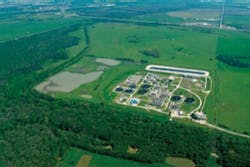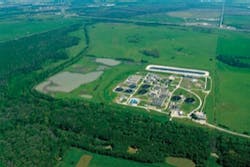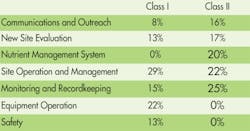Program Offers Certification for Biosolids Land Appliers
Certification plays an important role in helping to ensure protection of public health and the environment, yet while all states in the U.S. have a certification or licensing program for wastewater treatment operators, only a few options exist for the specialized area of biosolids land application.
The Association of Boards of Certification (ABC), an international non-profit organization established in 1972, introduced a biosolids certification program last year. Among early adopters, the Rocky Mountain Water Environment Association (RMWEA) is currently working to develop a biosolids land application voluntary certification program in Colorado using exams offered through ABC.
Jim Medlock, a member of the RMWEA Biosolids Committee and employee at the Littleton/Englewood Wastewater Treatment Plant, said that in the 1990s the committee saw an increase in the importance of training and certification development for operators and managers specializing in the beneficial use of biosolids. In response, they developed water and wastewater operator training schools.
"The schools began in 2001 to provide training for advancement in certifications, along with training units for certification renewals for treatment plant operators," he said. "In Colorado, we've recognized that land application of biosolids has become a more specialized area beyond the scope of most operator training opportunities."
RMWEA's training program focuses on providing necessary information for an individual to develop and manage a successful land application program. Through volunteer efforts, RMWEA developed training modules that covered necessary aspects to set up a program.
"We considered that not all land appliers and managers would have a background in wastewater treatment, so basics in wastewater and solids stabilization was a necessary topic, as well as industrial pretreatment," he said.
Once the course was implemented, Medlock says RMWEA examined the need for certifying individuals in the industry. They concluded that while wastewater operator certification is good, it does't cover all the aspects of land application of biosolids.
"Although the committee felt a certified wastewater operator has the knowledge and ability to oversee and operate a program, in this ever expanding field many land appliers do not have wastewater certification and lack the knowledge necessary to ensure that regulations are met. The need for a biosolids land appliers training program and certification is evident," Medlock said.
Suzanne De la Cruz at ABC says the certification program is unique to the industry.
"ABC's program is among the first to provide a mechanism for individuals to demonstrate expertise in the field through certification, just as their colleagues in wastewater treatment have done through state regulatory boards," she said.
ABC Certification Requirements
ABC conducted a national job analysis of land appliers to identify essential job tasks performed by land appliers and the capabilities required to competently perform job tasks.
"We used the results of the job analysis as the foundation for the development of valid land application certification exams," said De la Cruz. The Need-to-Know Criteria contains the results of the analysis and is available for certification programs and trainers to help prepare land appliers for biosolids certification.
ABC Biosolids Land Appliers Exam Specifications
For an individual to receive ABC biosolids certification, specific education, experience and examination requirements must be met for the level of which they are applying. Two levels of ABC certification are available:
Class I – Covers knowledge and skills required for field operators
Class II – Focuses on knowledge and skills required for managers
In addition to meeting established requirements, examinees must pass an exam with a score of 70 percent or higher. Testing options are flexible and exams can be administered nationally and internationally.
Both De la Cruz and Medlock agree certification is not only a way to help ensure public health, but provides numerous benefits for managers and employees.
"Certification provides land appliers with career advancement opportunities and a mechanism to demonstrate competency and professionalism in their field of expertise," said De la Cruz. "Additionally, employers can use certification to screen potential new hires, select contractors, and motivate employees to expand their knowledge and skills."
To learn more about the Rocky Mountain Water Environment Association, visit www.rmwea.org. For more information on ABC biosolids land applier certification, or to contact ABC, please visit www.abccert.org. For application, examination and renewal fees, visit the ABC Certification Program webpage. WW
More WaterWorld Current Issue Articles
More WaterWorld Archives Issue Articles



